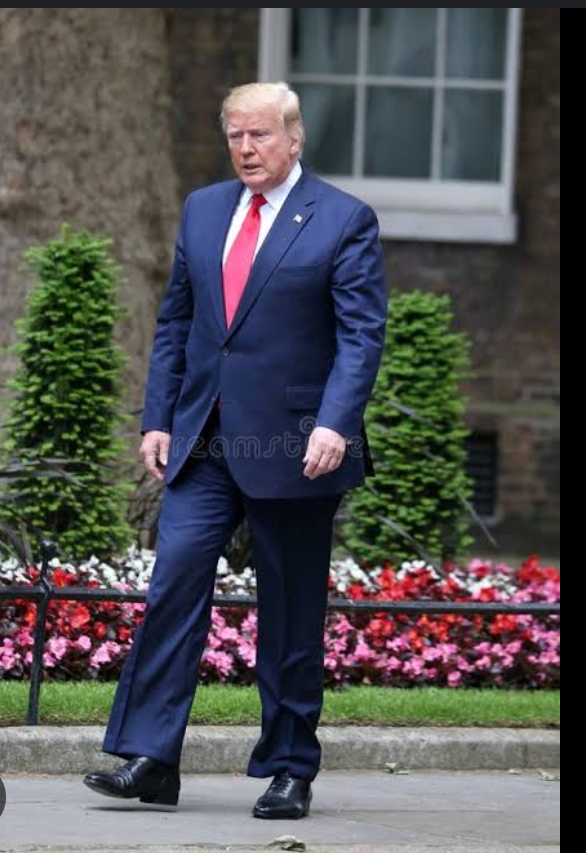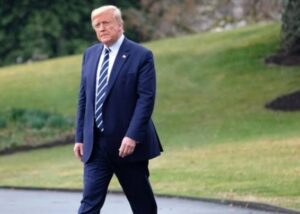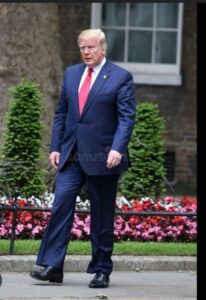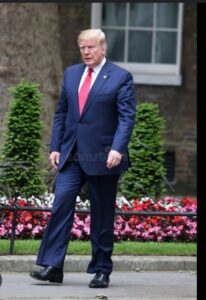CELEBRITY
“Trump Hints at a 3rd Term — ‘I’m Not Allowed to Run. It’s Too Bad!’ 😳🇺🇸Is he joking… or testing the waters for 2028? 👉 Watch the clip and tell us — should America change the 2-term rule or protect it at all costs? CHECK IT OUT HERE 👇👇⤵️

“Trump Hints at a 3rd Term — ‘I’m Not Allowed to Run. It’s Too Bad!’ 😳🇺🇸Is he joking… or testing the waters for 2028?
👉 Watch the clip and tell us — should America change the 2-term rule or protect it at all costs? CHECK IT OUT HERE 👇👇⤵️ 
Trump’s Remark Raises Alarm
While flying aboard Air Force One en route to South Korea, President Trump responded to a reporter’s question about whether he might seek another term in office by saying, “If you read it, it’s pretty clear … I’m not allowed to run. It’s too bad.”
Though he acknowledged the legal barrier, his tone and earlier comments reignited intense speculation about his long‐term political ambitions.
—
What He Has Said Before
Over the past several months, Trump has repeatedly alluded to the possibility of staying in power beyond two terms — despite the fact that the U.S. Constitution clearly restricts a president to two elected terms (under the Twenty‑Second Amendment). For instance:
In a March interview, he said: “I’m not joking … there are methods which you could do it.” 
At public events, he has asked crowds whether he should run again, and joked about doing it “three or four times.”
These remarks have led analysts and political opponents to worry about his views on democratic norms and term limits.
—
Legal Reality: The Constitution Steps In
The Twenty-Second Amendment, ratified in 1951, states: “No person shall be elected to the office of the President more than twice.” Legal scholars widely agree this text is unambiguous. Additionally, the Twelfth Amendment prevents someone who is not eligible for the presidency from being vice-president and thereby stepping into the presidency.
In short: the constitutional path for a third term run is essentially blocked under current law.
—
Why the Comment “It’s Too Bad” Matters
When Trump said “It’s too bad” that he can’t run again, two messages both loomed large:
1. Expression of regret — he seems disappointed by the restriction, suggesting he may personally want another term.
2. Signal to supporters — by acknowledging the limitation but drawing attention to it, he keeps the idea alive politically, even if legally unlikely.
In the sphere of public engagement and media, such a remark becomes fuel for debate — “Did he mean it?” “Is he testing the waters?” “Does this reflect a power ambition?” These are exactly the kind of questions that drive visibility and social media traffic.
—
Political & Public Implications
For his supporters: This comment energizes the base that sees Trump as a leader beyond conventional limits — “Why stop at two? If he’s still wanted, shouldn’t he stay?”
For opponents and democracy watchers: It raises alarms about norms of presidential turnover. If a popular leader starts imagining staying longer, the risk to checks and balances or democratic expectations becomes more visible.
For the broader electorate: It sparks debate around the fundamental question: Who gets to determine how long a leader stays? Rule of law? Popular mandate? Institutional guardrails?
—
What Comes Next
Legal challenge: Any attempt to change the term limit would require either a two-thirds majority in both houses of Congress or a constitutional convention called by two-thirds of state legislatures — then ratification by three-quarters of states. Very high bar.
Political strategy: Some speculation suggests a vice-president could run then resign, letting the president step in. Trump hinted such an idea “is one” method.
Public messaging: Trump’s acknowledgment may force other Republican leaders and the Democratic opposition to clarify: Will the party support an open discussion of term limits, or will they reject the idea entirely?
Media & social media reaction: Expect high engagement — memes, debates, polls asking: “Should presidents serve more than two terms?” “Does popularity override constitutional constraints?” These conversations help drive visibility, especially on platforms like Facebook.
—
Why This Topic Is a Social Media Magnet
Emotion & controversy: A leader talking about “breaking the rules” of the presidency triggers strong reactions (both positive and negative).
Easy to share: The quote is punchy and provocative: “I’m not allowed to run. It’s too bad.”
Wide appeal: Whether you care about American politics, democracy, or global norms, this story resonates.
Calls to action: People will comment, share, debate — “What do you think?” “Should Trump stay in power longer?” These drive algorithmic engagement.
—
Final Thought
Although the legal path for a third term for Trump is highly improbable, his remark that he is “too bad” he can’t run again has far-reaching symbolic power. It serves as both a rallying cry for supporters and a red flag for critics. That dual nature is what gives this story its viral potential — a convergence of personality, power, rules, and rebellion. In the landscape of social media and political conversation, it’s a potent mix.












